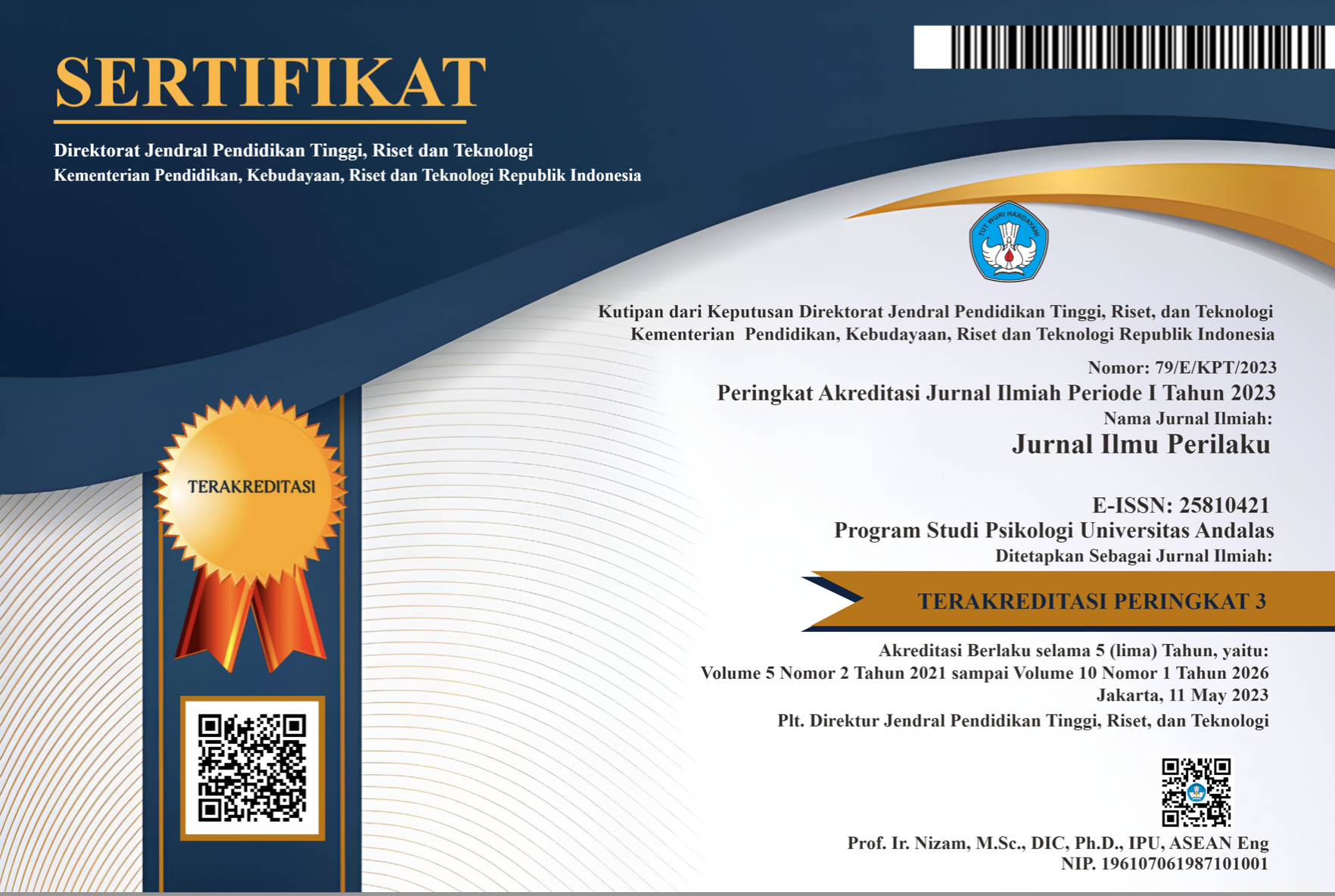How Does Support by the Organization Decrease Employee’s Intention to Leave?
Abstract
This study aims to investigate the mediating effect of affective commitment in the relationship between perceived organizational support and turnover intention. Data were collected using paper-and-pencil survey on inbound Customer Service Officers (CSO) of a Contact Center X in Jakarta operating in service of electricity needs by phone calls (N = 96). Data were analyzed using Hayes PROCESS macro on SPSS software. Results showed that perceived organizational support was negatively related to turnover intention and positively related to affective commitment. Results also showed that affective commitment was negatively correlated with turnover intention. The mediation analysis showed that affective commitment fully mediated the relationship between perceived organizational support and turnover intention. The theoretical and practical implications of the study were further discussed.
Downloads
References
Allen, D.G., Shore, L.M., & Griffeth, R.W. (2003). The role of perceived organizational support and supportive human resource practices in the turnover process. Journal of Management, 29, 99-118. doi:10.1016/S0149-2063(02)00222-2
Alsaraireh, F., Quinn Griffin, M. T., Ziehm, S. R., & Fitzpatrick, J. J. (2014). Job satisfaction and turnover intention among Jordanian nurses in psychiatric units. International Journal of Mental Health Nursing, 23, 460-467. doi: 10.1111/inm.12070
Barak, M. E. M., Levin, A., Nissly, J. A., & Lane, C. J. (2006). Why do they leave? Modeling child welfare workers' turnover intentions. Children and Youth Services Review, 28, 548-577. doi: 10.1016/j.childyouth.2005.06.003
Biron, M., & Boon, C. (2012). Performance and turnover intentions: a social exchange perspective. Journal of Managerial Psychology, 28, 511-531. doi: 10.1108/JMP-09-2011-0054.
Brislin, R.W. (1970). Back-translation for cross-cultural research. Cross-Cultural Psychology, 01, 185-216.
Bozeman, D.P., & Perrewe, P.L. (2001). The effect of item content overlap on organizational commitment questionnaire – turnover cognitive relationships. Journal of Applied Psychology, 86, 161-173. doi: 10.1037//0021-9010.86.1.161.
Contact Center Overview. (2008). Retrieved from The Global CC Community website: GloCCall.com
Cummings, T.G., & Worley, C.G. (2009). Organizational Development and Change 9th Ed. Canada: South-Western Cengage Learning.
Dawley, D., Houghton, J.D., & Bucklew, N.S. (2010). Perceived organizational support and turnover intention: the mediating effects of personal sacrifice and job fit. The Journal of Social Psychology, 238-257. doi: 10.1080/00224540903365463.
Eisenberger, R., Huntington, R., Hutchison, S., & Sowa, D. (1986). Perceived organizational support. Journal of Applied Psychology, 71, 500-507. doi: 10.1037/0021-9010.71.3.500.
Fazio, J., Gong, B., Sims, R., & Yurova, Y. (2017). The role of affective commitment in the relationship between social support and turnover intention. Management Decision, 55, 512-525.
Hancock, J.I., Allen, D.G., Bosco, F.A., McDaniel, K.R., & Pierce, C.A. (2011). Meta-analytic review of employee turnover as a predictor of firm performance. Journal of Management, 1-31. doi: 10.1177/0149206311424943.
Hausknecht, J. P., & Trevor, C. O. (2011). Collective turnover at the group, unit, and organizational levels: Evidence, issues, and implications. Journal of Management, 37, 352-388. doi: 10.1177/0149206310383910
Head & Coordinator of Operational Contact Center X Jakarta. (2017, January 23-24). Personal interview.
Hongvichit, S. (2015). The research progress and prospect of employee turnover intention. International Business Research, 218-223. doi: 10.5539/ibr.v8n6p218.
Kahumuza, J., & Schlechter, A.F. (2008). Examining the direct and some mediated relationships between perceived support and intention to quit. Management
Dynamics: Journal of the Southern African Institute for Management Scientist, 17, 2-19.
Kurtessis, J.N., Eisenberger, R., Ford, M.T., Buffardi, L.C., Stewart, K.A., & Adis, C.S (2015). Perceived organizational support: A meta-analytic evaluation of organizational support theory. Journal of Management. doi: 10.1177/0149206315575554. Retrieved from jom.sagepub.com.
Meyer, J.P., Allen, N. (1991). A three-component model conceptualization of organizational commitment. Human Resource Management Review, 1, 61-89. doi: 10.1016/1053-4822(91)90011-Z.
Meyer, J.P., Allen, N.J., & Smith, C.A. (1993). Commitment to the organizations and occupations: extensions and test of a three-component conceptualization. Journal of Applied Psychology, 78, 538-551. doi: 10.1037/0021-9010.78.4.538
Meyer, J.P., Allen, N.J. (1997). Commitment in the Workplace: Theory, Research, and Application. Thousand Oaks: Sage Publications.
Mobley, W.H., Horner, S.O., & Hollingsworth, A.T. (1978). An evaluation precursor of hospital employee turnover. Journal of Applied Psychology, 63, 408-414. doi: 10.1037/0021-9010.63.4.40
Park, T.Y., & Shaw, J.D. (2013). Turnover rates and organizational performance: a meta-analysis. Journal of Applied Psychology, 98, 268-309. doi: 10.1037/a0030723.
Preacher, K.J., & Hayes, A.F. (2008). Asymptotic and resampling strategies for assessing and comparing indirect effects in multiple mediator models. Behavior Research Methods, 40, 879-891. Retrieved from http://afhayes.com/spss-sas-and-mplus-macros-and-code.html.
Purba, D. E., Oostrom, J. K., van der Molen, H. T., & Born, M. P. (2015). Personality and organizational citizenship behavior in Indonesia: The mediating effect of affective commitment. Asian Bussiness & Management, 1-24. doi: 10.1057/abm.2014.20.
Purba, D. E., Oostrom, J. K., Born, M. P., & van der Molen, H. T. (2016). The relationships between trust in supervisor, turnover intentions, and voluntary turnover: Testing the mediating effect of on-the-job embeddedness. Journal of Personnel Psychology, 174-183. doi: 10.1027/1866-5888/a000165.
Rhoades, L., Eisenberger, R., & Armeli, S. (2001). Affective commitment to the organization: the contribution of perceived organizational support. Journal of Applied Psychology, 86, 825-836. doi: 10.1037//0021-9010.86.5.825.
Rhoades, L., & Eisenberger, R. (2002). Perceived organizational support: A review of the literature. Journal of Applied Psychology, 87, 698-714. doi: 10.1037//0021-9010.87.4.698.
Riggle, R. J., Edmondson, D. R., & Hansen, J. D. (2009). A meta-analysis of the relationship between perceived organizational support and job outcomes: 20 years of research. Journal of Business Research, 62, 1027-1030. doi: 10.1016/j.jbusres.2008.05.003
Robbins, S. P., & Timothy A Judge. (2013). Organizational Behaviour (15th Edition). Boston: Prentice Hall.
Tett, R.P., & Meyer, J.P. (1993). Job satisfaction, organizational commitment, turnover intention, and turnover: path analysis based on meta-analytic findings. Personnel Psychology, 46, 259-293. doi: 10.1111/j.1744-6570.1993.tb00874.x
Tuzun, I.K., & Kalemci, R.A. (2011). Organizational and supervisory support in relation to employee turnover intentions. Journal of Managerial Psychology, 27, 518-534. doi: 10.1108/02683941211235418.
Voydanoff, P. (1988). Work role characteristics, family structure demands, and work/family conflict. Journal of Marriage and the Family, 749-761. doi: 10.2307/352644
Wayne, S.J., Shore, L.M, & Liden, R.C. (1997). Perceived organizational support and leader-member exchange: a social exchange perspective. The Academy Management Journal, 40, 82-111. doi: 10.2307/257021.
Willis, T. A., O'Connor, D. B., & Smith, L. (2008). Investigating effort–reward imbalance and work–family conflict in relation to morningness–eveningness and shift work. Work & Stress, 22, 125-137. doi: 10.1080/02678370802180558
Wong, Y.W., & Wong, Y.T (2017). The effect of perceived organizational support and affective commitment on turnover intention: a test of two competing models. Journals of Chinese Human Resource Management, 08, 2-21. doi: http://dx.doi.org/10.1108/JCHRM-01-2017-0001.
The non-commercial use of the article is governed by the Creative Commons Attribution license as currently displayed on Creative Commons Attribution-NonCommercial-ShareAlike 4.0 International License.
JIP's spirit is to disseminate articles published are as free as possible. Under the Creative Commons license, JIP permits users to copy, distribute, display, and perform the work for non-commercial purposes only. Users will also need to attribute authors and JIP on distributing works in the journal.
Please find the rights and licenses in Jurnal Ilmu Perilaku (JIP).
- License
The non-commercial use of the article will be governed by the Creative Commons Attribution license as currently displayed on Creative Commons Attribution-NonCommercial-ShareAlike 4.0 International License.
- Author’s Warranties
The author warrants that the article is original, written by stated author(s), has not been published before, contains no unlawful statements, does not infringe the rights of others, is subject to copyright that is vested exclusively in the author and free of any third party rights, and that any necessary written permissions to quote from other sources have been obtained by the author(s).
- User Rights
JIP's spirit is to disseminate articles published are as free as possible. Under the Creative Commons license, JIP permits users to copy, distribute, display, and perform the work for non-commercial purposes only. Users will also need to attribute authors and JIP on distributing works in the journal.
- Rights of Authors
Authors retain the following rights:
- Copyright, and other proprietary rights relating to the article, such as patent rights,
- The right to use the substance of the article in future own works, including lectures and books,
- The right to reproduce the article for own purposes, provided the copies are not offered for sale,
- The right to self-archive the article.
- Co-Authorship
If the article was jointly prepared by other authors, the signatory of this form warrants that he/she has been authorized by all co-authors to sign this agreement on their behalf, and agrees to inform his/her co-authors of the terms of this agreement.
- Termination
This agreement can be terminated by the author or JIP upon two months’ notice where the other party has materially breached this agreement and failed to remedy such breach within a month of being given the terminating party’s notice requesting such breach to be remedied. No breach or violation of this agreement will cause this agreement or any license granted in it to terminate automatically or affect the definition of JIP.
- Royalties
This agreement entitles the author to no royalties or other fees. To such extent as legally permissible, the author waives his or her right to collect royalties relative to the article in respect of any use of the article by JIP or its sublicensee.
- Miscellaneous
JIP will publish the article (or have it published) in the journal if the article’s editorial process is successfully completed and JIP or its sublicensee has become obligated to have the article published. JIP may conform the article to a style of punctuation, spelling, capitalization, referencing and usage that it deems appropriate. The author acknowledges that the article may be published so that it will be publicly accessible and such access will be free of charge for the readers.










